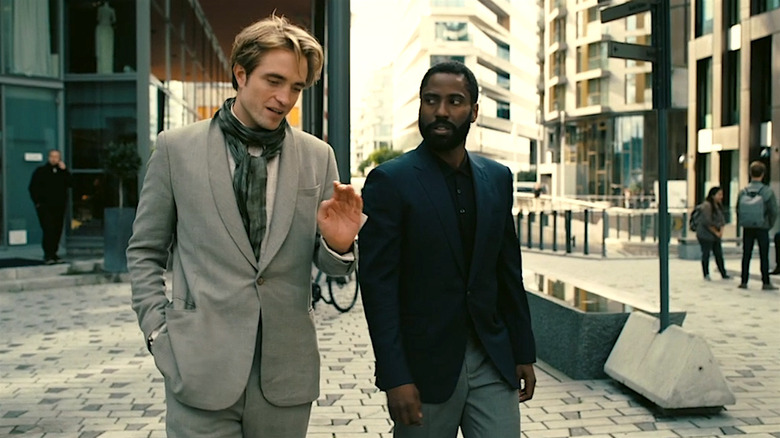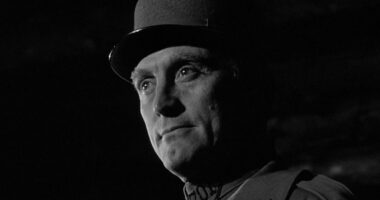Share this @internewscast.com
If you have a favorite director, chances are your favorite director also has someone they look up to in the industry. Enter Quentin Tarantino. While he hasn’t explicitly stated that fellow Oscar winner Christopher Nolan is his favorite director, Tarantino did share significant admiration for Nolan’s 2017 film “Dunkirk.” The film focuses on the evacuation of Allied forces during World War II and uses minimal dialogue, relying instead on atmosphere and action as soldiers travel by plane, land, and sea. For a time, “Dunkirk” held the position as Tarantino’s seventh favorite movie ever, but after several rewatchings, it climbed to the second spot.
“I had an interesting experience with it the first couple of times,” Tarantino shared with co-hosts Sean Fennessey and Chris Ryan on The Ringer’s “Rewatchables” podcast. “The first time I saw it, I don’t know what I was thinking the first time. I just dealt with the spectacle of it all. I couldn’t deal with anything else but the spectacle of it all.”
As Tarantino recounted, the immersive way Nolan shot the film initially overwhelmed him in his first few viewings. “I liked the movie, but the spectacle almost numbed me to the experience,” he reflected. “I don’t think I felt anything emotional. I was awed by it. But I didn’t know what I was awed by. … It wasn’t until the third time that I could see past the spectacle and into the people the story is about. I finally could see through the trees a little bit.”
Eventually, Tarantino grasped exactly how Nolan crafted the film, gaining a deeper appreciation for one of Nolan’s masterworks. “Oftentimes, you see a film where the style is about the adrenaline of it,” Tarantino explained. “The style is an immersive experience, but by the third or fourth viewing you get past the style and you realize the magician’s tricks. In the case of ‘Dunkirk,’ it rewards Nolan’s efforts to see it more. There’s a point, by mid-movie, he can’t do it wrong […] It’s a symphony. Nothing doesn’t work.”
Tarantino is right, but there’s something ironic about his take on “Dunkirk” — because some of his movies are a bit tricky too.
One of Quentin Tarantino’s most universally beloved films requires repeat viewings
The intriguing aspect of Quentin Tarantino’s observations on “Dunkirk” is that they could just as easily apply to his own iconic film. In 1994, audience members were astounded when Tarantino released “Pulp Fiction,” comprised of violent vignettes he wrote and directed, featuring stars like John Travolta, Samuel L. Jackson, Uma Thurman, Harvey Keitel, Tim Roth, Amanda Plummer, Ving Rhames, and Bruce Willis, to name a few. What caught many first-time viewers off guard in the 1990s is that “Pulp Fiction” is structured through non-linear stories that ultimately revolve around hitmen Vincent Vega (Travolta) and Jules Winnfield (Jackson) as they navigate various scrapes in Los Angeles.
While the stories in “Pulp Fiction” do eventually connect — which is similarly the case for “Dunkirk,” as all events relate to the same larger incident — multiple viewings may be required to discern the chronology. From Mia Wallace’s (Thurman) accidental overdose and miraculous revival to boxer Butch Coolidge (Willis) managing his relationship and contemplating whether to throw a fight at the behest of crime boss Marsellus Wallace (Rhames), everything is connected, but understanding it fully might take more than one watch … and the question of what’s inside that mysterious suitcase might remain unsolved. While Tarantino’s observations about Nolan’s work are accurate, it’s interesting that one of Tarantino’s most critically acclaimed films shares similarities in complexity — albeit differing in content and themes.
Nearly all of Christopher Nolan’s movies are a bit tough to understand at first, but they’re well worth the effort
Quentin Tarantino definitely has a point about Christopher Nolan, though; almost all of the director’s films benefit from rewatches, because they’re all fairly dense and many of them utilize narrative frameworks that aren’t exactly straightforward. Take one of his earliest films, “Memento,” which stars Guy Pearce as a man experiencing short-term memory loss who has to keep notes on his body using tattoos to figure out what happened to him and who killed his wife; this movie demands that the audience solve the mystery alongside Pearce’s Leonard, and you definitely can enjoy it even more on a second viewing once you get a grasp of the plot. “The Prestige” is a full-on mystery box movie that features one of the most baffling and incredible twists in recent cinematic history, and “Inception,” another Nolan favorite, is “straightforward” in that it’s told in a linear fashion, but it also constantly subverts audience expectations by forcing you to wonder if what you’re seeing is a dream or reality.
Probably the most famously confusing Nolan movie, though, is his 2020 time-travel magnum opus “Tenet,” where a mysterious man known only as The Protagonist (John David Washington) has to continuously move backwards through time to help figure out who orchestrates a massive attack in the present timeline. (That’s sort of a shoddy explanation; “Tenet” is extraordinarily dense, and there are plenty of explainers, including one at Looper, that can help you make sense of this twisting, turning film.) Even Nolan’s biopic of the father of the atomic bomb, J. Robert Oppenheimer (played by Oscar winner Cillian Murphy), doesn’t utilize a particularly linear structure — frankly, the director’s most “straightforward” films are the ones in his “Dark Knight” trilogy.
You can watch “Dunkirk” streaming on major platforms, where you can rent or buy Nolan’s inventive film.











